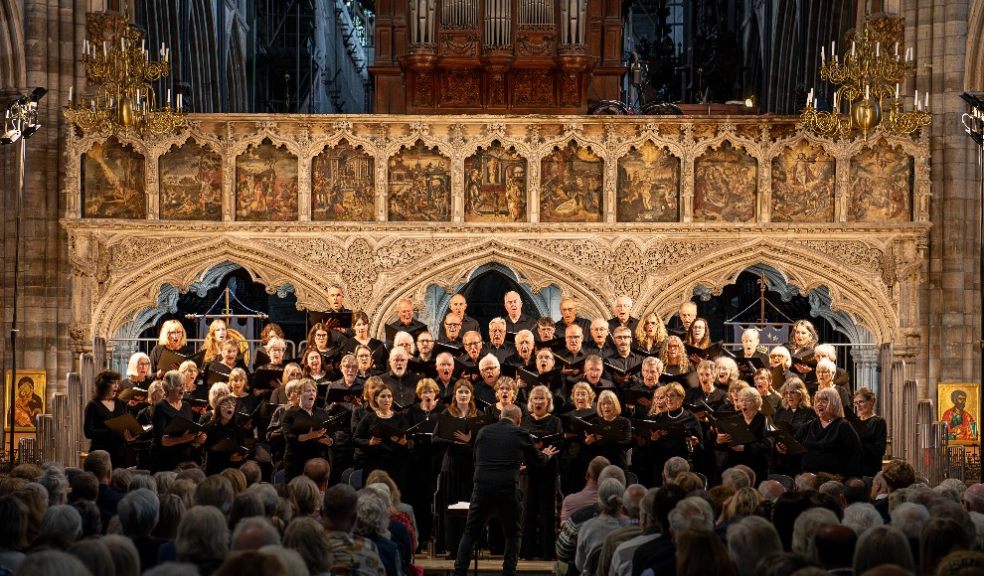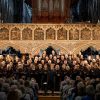
Choir's weather-themed world premiere
Exeter Philharmonic Choir is preparing to begin its 2025/26 season with a very special musical first at Exeter Cathedral on Saturday 8 November - performing an ambitious new choral work called The Weather Book, written for the choir by one of the UK’s leading contemporary composers and highlighting Exeter’s unique status as the home of the UK’s Met Office.
The new work for soprano soloist, choir and chamber orchestra, composed by Cecilia McDowall, is a joint commission with a top chamber choir from Sweden. Gustaf Vasa Kammarkör performed the first movement called ‘Celsius Rising’ in March in their home city of Stockholm. Swedish soprano Agnes Auer will be coming to Exeter in November to give the première of the entire work, with the addition of the second and third movements composed especially for EPC. It was sheer chance that the two choirs approached Cecilia at the same time to commission a bespoke work. The result is a composition that links the two countries through reference to aspects of the history of the weather and meteorology.
In its entirety, The Weather Book lasts about twenty minutes, and it will be the centrepiece of an exciting and varied programme that also includes Poulenc's Gloria, Vaughan Williams’ Toward the Unknown Region and Brahms' Tragic Overture and Alto Rhapsody, four wonderful pieces showcasing the choir’s range and versatility.
Cecilia McDowall’s inspiration for the commission was to link the UK and Sweden through references to climate. She worked with poet and librettist Kate Wakeling to discover different aspects of weather-related topics. Cecilia says, “Swedish scientist Anders Celsius was my first thought, although I had only been aware of his name in connection with his establishing the centigrade temperature scale. But my wonderful poet and librettist, Kate Wakeling, discovered so much more about this remarkable man whose scientific work spanned many other interests, including a detailed study of the Northern Lights. This led him to make a ground-breaking connection between the Aurora Borealis and changes in the magnetic field of the Earth.
“Kate also drew attention to Celsius’ belief in the need for ‘extensive scientific data, collected methodically and over long periods, a somewhat radical approach in his day. It was a fortuitous discovery that Exeter Philharmonic Choir is based in the home city of the UK’s Meteorological (‘Met’) Office, an institution which holds many important historical archives relating to weather and, in particular, to its founder, Captain Robert FitzRoy. He was captain of HMS Beagle, which took on board two famous men, evolutionist Charles Darwin and Francis Beaufort, creator of the Beaufort Wind Scale. With his naval background, FitzRoy understood the importance of gathering information about the weather at sea to prevent calamity wherever possible. Kate has drawn on FitzRoy’s own ‘Weather Book’ for the last movement of this work.
“She has also found an important source for the middle movement, called ‘History of Air’. In 1856, the American scientist and women's rights campaigner Eunice Newton Foote conducted a series of experiments that proved for the first time that altering the proportion of carbon dioxide in the atmosphere changes its temperature. This relationship between carbon dioxide and the earth’s climate is one of the key principles of modern meteorology and continues to shape our understanding of the greenhouse effect and climate science as a whole.”
Howard Ionascu, EPC’s Musical Director, says, “This is very exciting for the choir as we prepare to rise to the challenge of the new composition. We look forward to Cecilia joining us at an ‘away day’ in early October at Buckfast Abbey to rehearse this concert and her newly commissioned piece. We’re also looking forward to welcoming solo soprano Agnes Auer, whose performance will weave a spellbinding thread that unifies all three movements and provides a vocal link between the two choirs. Continuing EPC’s proud tradition of supporting rising stars, Agnes will be joined by two other young soloists. Soprano Seohyun Go, a South Korean artist studying in London, will be the soloist in Poulenc’s Gloria, and mezzo-soprano Cecily Shaw from New Zealand will sing the title role in Brahms’ Alto Rhapsody.”
The singers will be accompanied by the Bristol Ensemble, a versatile collective of professional musicians whose repertoire spans 17th-century works (played on original instruments) to contemporary and experimental music.
The concert will start in the Cathedral at 7.30 pm, following a pre-concert talk at 6.30 pm at the Devon and Exeter Institution in Cathedral Close. Cecilia will lead a discussion about her composition, and will be joined by Met Office Chief Executive Professor Penny Endersby, who was last year awarded a CBE in the New Year’s Honours List for services to meteorology, defence science and technology. Professor Endersby is a keen musician and an active member of Exeter Cathedral, as their first Canon Scientist, as well as a member of their voluntary choir.
Professor Endersby says, “I was really thrilled when I heard about this project and read the details. Of course, I’m familiar with Exeter Philharmonic Choir, I’ve been to some of their concerts, and I’m certainly familiar with Cecilia McDowall, but I was particularly struck by two elements; it being about our founder Robert FitzRoy and Eunice Foote, who’s a great heroine of mine. What with that and me being a singer as well, it really ticks a lot of boxes and so I was keen to support it in any way that I could.”
The Met Office is kindly lending the Choir copies of historic weather-related documents, including pages from the original Weather Book. These will be exhibited at the pre-concert talk. Admission to this event is free, but tickets are very limited and must be booked with concert tickets: tickets@exeterphilharmonic.org.uk




















